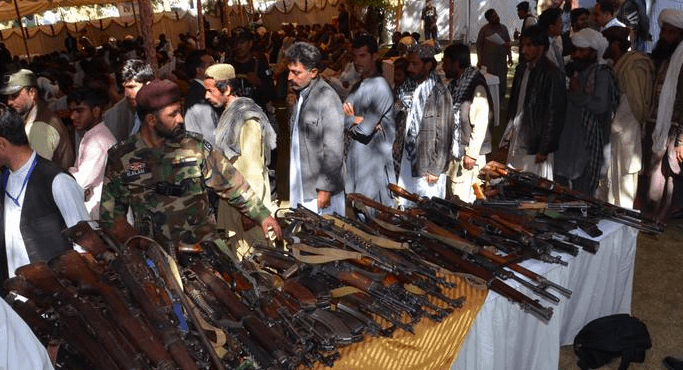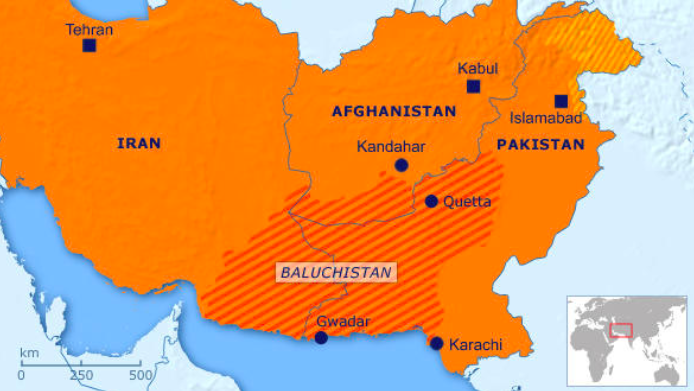Baluchistan’s Violent “Independence” Movement
November 25, 2018 | Expert Insights

The 23 November attack on the Chinese consulate in Karachi was claimed by the Baluchistan Liberation Army (BLA), an insurgent group engaged in a violent conflict with Pakistani security forces for the "liberation" of the western Baluchistan province.
Background
Pakistan borders Afghanistan at the Durand Line, which runs from the Hindu Kush and the Pamir Mountains. A narrow strip of Afghanistan territory called the Wakhan Corridor extends between Pakistan and Tajikistan. From the eastern tip of the Wakhan Corridor starts the Sino-Pak border between the People's Republic of China and Pakistan spanning about 510 km. Iran has a province named Sistan via Baluchistan that borders Pakistan. Baluchis are an ethnic majority in this area. In 1957 Pakistan signed a frontier agreement with Iran according to which the border was officially declared and the two countries haven't had this border as a subject of serious dispute at all.
The relationship between China and Pakistan first began in the 1950s. Pakistan was one of the first countries to recognise the People’s Republic of China and to end diplomatic ties with the Republic of China (Taiwan). Pakistan serves as China's main bridge to the Islamic world, while China is one of Pakistan's key trading partners. The China-Pakistan Economic Corridor (CPEC) has brought about a radical change in Pakistan.
On 23 November, three suicide attackers tried to storm the Chinese consulate in the Pakistani city of Karachi but were killed before they could get into the building. The Baloch Liberation Army, a separatist group have claimed responsibility for the attack. This was the highest-profile operation in years by the BLA as it mostly had engaged in a low-level insurgency in Baluchistan. The Pakistani Prime Minister Imran Khan has ordered an inquiry, with his office calling the attack “part of conspiracy against Pak and China economic and strategic cooperation”.

Analysis
The 23 November militant attack on a Chinese consulate in Pakistan's southern Karachi city was claimed by separatists who seek Baluchistan's "independence" from Islamabad. The Baloch Liberation Army, or BLA, also vehemently opposes Chinese projects in the western province that borders Iran and Afghanistan.
Baloch separatists, both militant and political groups, oppose China's increasing involvement in the province. In March, Aslam Baloch, a BLA commander, told Indian media that Pakistan and China are exploiting Baluchistan's resources. Jihand Baloch, the spokesperson for the BLA said that their "fighters" carried out the attack on Pakistan's security forces and Chinese workers. Fawad Chaudhary, Pakistan's information minister, said that the militants chose 23 November to launch an attack because it was "a visa collection day, and militants wanted to inflict maximum damage."
The armed struggle for Baloch "independence" intensified after the killing of Nawab Akbar Bugti, a nationalist leader, in 2006. Rebel Baloch groups like the BLA have repeatedly attacked security forces and state installations in the province since then, although most of the rebel leadership is thought to be based abroad in the UK, Afghanistan and Dubai.
Local rights groups claim they have the details of thousands of Baloch people who have disappeared over the past ten years and have not been seen since. Pakistani security agencies claim these people were arrested on terrorism charges. However, the whereabouts of these people are kept secret from the public; they have not been presented to local courts for a proper trial, Baloch activists claim.
Political analysts say that Islamabad needs to end the military operation in Baluchistan and find a political situation to deal with the separatism issue in the province. But the issue of who controls Baluchistan's resources remains a bone of contention.
Brahamdagh Bugti, leader of the Baloch Republican Party living in exile in Switzerland, and grandson of slain nationalist leader Nawab Akbar Bugti, said that Chinese economic projects in Baluchistan were aimed at "colonising" the province, and must be resisted. Criticizing CPEC, Bugti said he fears "there will be massive human rights abuses in Baluchistan because of this deal."
Counterpoint
Pakistani authorities have maintained that Baloch separatists are retrogressive and an impediment to the development of their province. Many Pakistanis share this view. Additionally, several analysts are concerned that the attack will harm Chinese-Pakistani relations and the China-Pakistan Economic Corridor.
Assessment
Our assessment is that the attack on the Chinese consulate in Karachi will not have a significant impact on China-Pakistan Economic Corridor, as the CPEC has remained unaffected despite killings of several Chinese workers in Baluchistan in the past. We believe the attack will do more harm to the peaceful right's movement of the Baloch people.








Comments